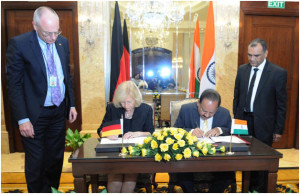
 India and Germany have signed agreements for furthering cooperation in the field of Science & Technology.
India and Germany have signed agreements for furthering cooperation in the field of Science & Technology.
The Union Minister for Science & Technology and Earth Sciences Dr. Harsh Vardhan and the German Federal Minister for Education and Research Johanna Wanka signed the main agreement and witnessed signing of another agreement by the officials for the purpose after mutual discussions in New Delhi.
“The two countries reiterated that they would continue to support and strengthen the basic research component of collaboration which will underpin future technology developments,” an official release said.

India is investing approximately 14 million euro for the construction of an additional beam line and access to the synchrotron facility at PETRA-III in DESY at Hamburg. Similarly, India is equity share holder with investment of 36 million euro in the construction of the international “Facility for Antiproton-Ion Research” (FAIR) at Darmstadt.
Dr. Harsh Vardhan offered Germany to participate in some of the future mega science projects, which India will be embarking upon.

A major highlight of the meeting was the agreement on both sides to extend the bi-national Indo-German Science & Technology Center (IGSTC) beyond 2017 with increase in funding from 2 million euro to 4 million euro every year.
“This is a reflection of the common endeavour on both sides to support industrially relevant R&D projects that have potential to generate novel technologies and new intellectual property in sectors such as advance manufacturing, embedded systems & ICT for automobiles, renewable energy, food security, clean water and health care technologies – all of which are in tune with present national missions of the government of India,” the release added.
India is the only country with whom Germany has such a bilateral R&D Centre dedicated to promote applied and industrial R&D. The Centre is already supporting 15 joint projects and pro-types of some new technologies have been co-developed in solar-thermal energy, stress tolerant chic-pea variety, and high altitude cold resistance plants etc.
Both the countries echoed that the future cooperation should focus on programs to promote innovation and techno-entrepreneurship by linking the SME and Start-up enterprises of both the countries in order to make meaningful contribution to the knowledge economy and use the tools of science and technology to address socially relevant challenges. New areas such as anti-microbial resistance and regenerative medicine, earth science system including monsoon studies and marine sciences required to understand the climate change process was emphasised by the Indian side that needs to be addressed together.
Be a part of Elets Collaborative Initiatives. Join Us for Upcoming Events and explore business opportunities. Like us on Facebook , connect with us on LinkedIn and follow us on Twitter, Instagram.











